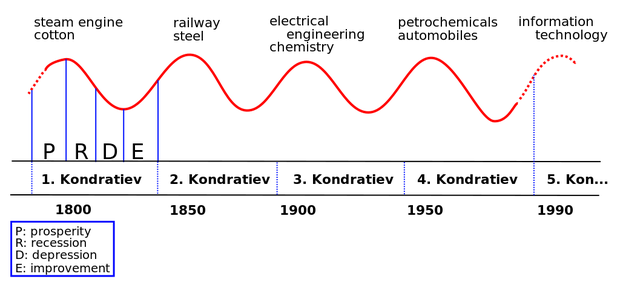Economic winter to last until 2020?
A 100-year-old theory by a Russian economist Nikolai Kondratiev forecasts us other several years of depression. However, a recession can last longer as the world central banks' policies prevent economic recovery.
The world is undergoing an economic winter, considers Business Insider UK. This term relates to the economic theory created by the Russian economist in the 1920s. According to the theory, capitalist economies go through 50-60 year cycles (later Joseph Schumpeter named them for their creator — the Kondratiev Waves). The cycles are driven by a number of factors, including population growth, wars, the relationship between agriculture and industry, prices and technology.
Nikolai Kondratiev published his book The Major Economic Cycles in 1925 (in 1930, the economist was arrested and sent to a 'political isolator', and in 1938, after the second trial, he was executed by firing squad). Kondratiev stated that the waves affect all sectors of economy, however, he focused on prices and interest rates. He analysed several Western economies and supposed that a cycle has three phases: expansion, stagnation and recession. The theory was refined by Kondratiev's followers, and now the wave is commonly divided into four phases: spring (period of improvement), summer (prosperity), autumn (recession) and winter (depression). The first cycle of the 19th century started in 1789 and ended in 1849, the next one was in 1850-1896, and the last one started in 1896.
Kondratiev also used his theory to predict future economic cycles. According to the calculations, right now we are going through the economic winter, which is characterised by deflation, economic depression, high levels of bankruptcy and unemployment. Traditionally, winter also brings a collapse of commodity prices. The S&P GSCI Total Return Index, an index that reflects global commodity prices, is down 52% for both the past three and five years. Gold is the only exception, the prices are up 200% since the end of 2000, so it can be a safe-haven asset if the worst of winter is indeed coming, believes Business Insider UK.
The winter phase began in 2000 and it is expected to last about 20 years, so we will probably suffer other several years of recession. Even so, a depression is a natural part of the cycle and a way to clean the economic system of excess. It is usually followed by a period of recovery, although a few elements of the winter period are missing from the picture. For example, we are not observing rising interest rates due to the world's central banks' policies. These policies may interfere with the natural 'cleansing' of debt because low interest rates stimulate people and countries to borrow more. Thus, the 'spring' boom that follows the recession is being delayed, and the eventual 'cleansing' will likely to be more tough.
 The Kondratiev Wave. Photo: Rursus
The Kondratiev Wave. Photo: Rursus